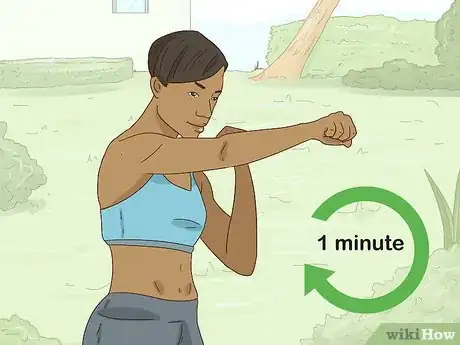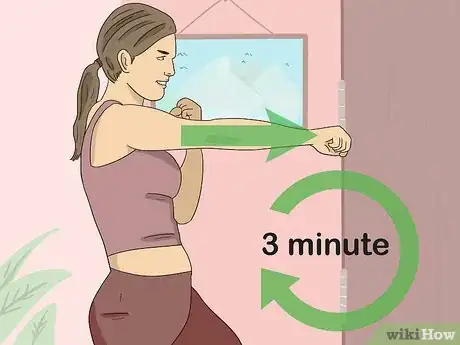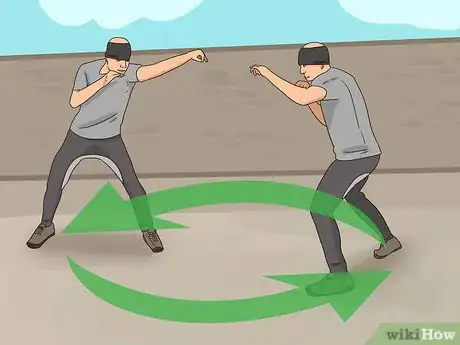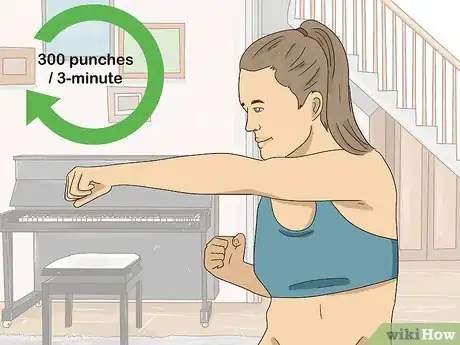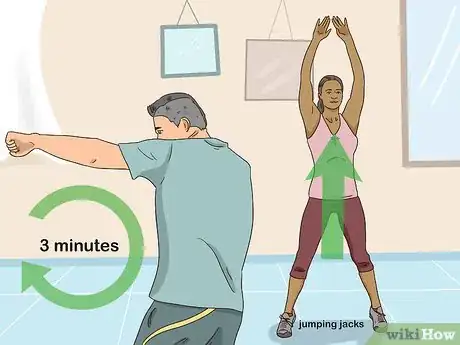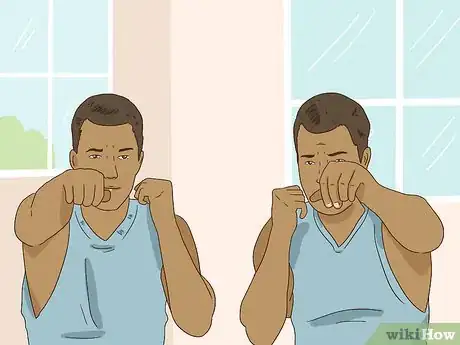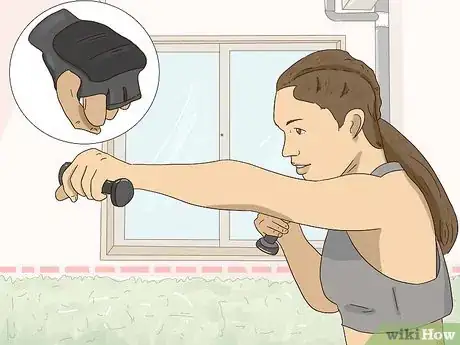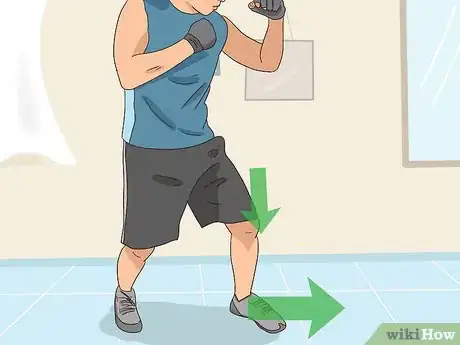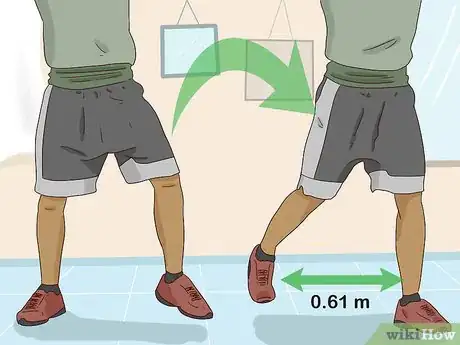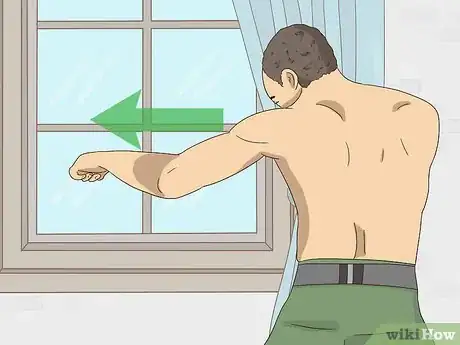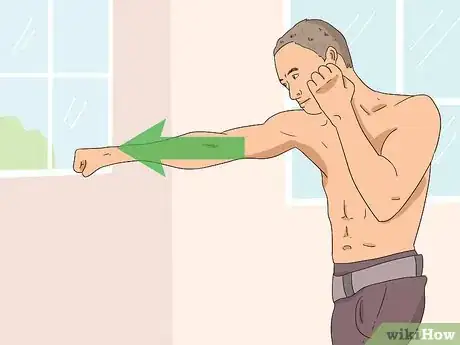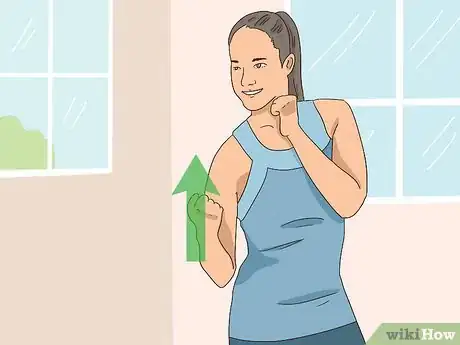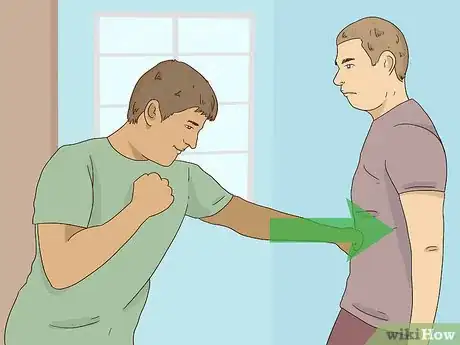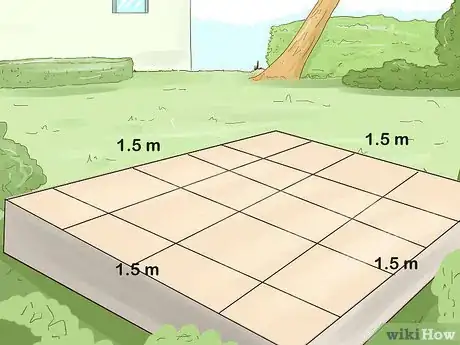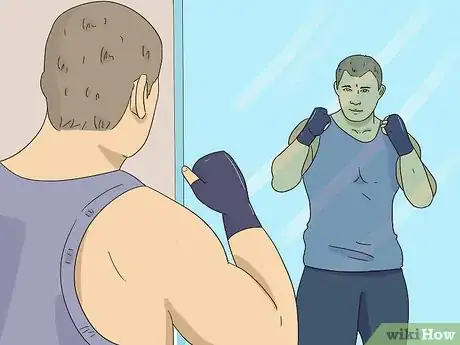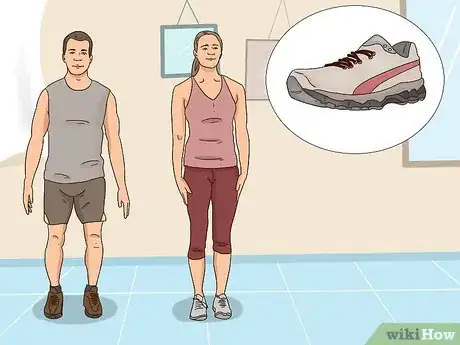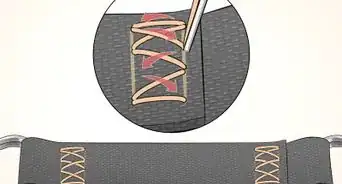This article was co-authored by Souad Gharib. Souad Gharib is the Founder of Female Trainer, a boutique women's gym based in West London, United Kingdom. Souad specializes in helping women reach their goals through exercise, nutrition, and counseling. Female Trainer offers personalized training sessions delivered by Souad and her experienced team of female trainers.
wikiHow marks an article as reader-approved once it receives enough positive feedback. In this case, 100% of readers who voted found the article helpful, earning it our reader-approved status.
This article has been viewed 264,344 times.
Shadow boxing is the act of punching into the air, usually without an opponent, as exercise. The name comes from the practice of standing close to a wall and pretending to punch the shadow you project onto it. It’s a great way to exercise and to improve your boxing skills. Learning the basic steps will help you develop a fun, effective shadowboxing workout.
Steps
Creating a Shadow Boxing Workout
-
1Get in the correct stance and punch slowly for 1 minute. You can use any punch you like for this warm-up. Flex your arm muscles and make the movements as slow and deliberate as possible. When you are confident that you are ready to speed up, then you can begin to move faster.
- Switch which leg you lead with half way through your work out so you strengthen both sides of your body equally.
- It's important that you're practicing with good form. Focus on nailing the form before speeding things up.[1]
-
2Punch into the air for 3 straight minutes at any speed. Set a timer for three minutes. Do the same punches as your warm-up, or use any combination you like. Keep your knees bent and your core centered to retain your balance. Avoid banging your joints when you extend your arms.
- When punching, extend 1 arm while the other arm guards you, unless you are doing a combination. Practice bringing 1 arm back to guard position. You can also use your torso to amp up your workout. Turn your right side forward, then your left side forward. The feet will follow.
- Dodges and drops can help increase your heart rate and provide interest to your workout.
Advertisement -
3Add in footwork. While the timer is running, incorporate lunges, squatting, or hopping between feet. You should act like you’re following your “opponent” around the ring. Footwork and hopping increases the intensity of this cardiovascular workout.
- You can do the punches and footwork separately, and then try adding them together. When you choose to add the footwork is up to your personal fitness level. If you’re a beginner, wait until the last minute to add footwork.
-
4Rest between exercises. Take a three-minute rest between each set of exercises. You can drink water, stretch, or just sit down for a few minutes. It’s okay to feel tired and sweaty--it means you’re getting a workout!
-
5Speed punch for 3 minutes. After your rest, do a variety of punches as fast as you can in 3 minutes. A boxer usually aims to throw about 250 to 300 punches per 3-minute period. You will be much slower than this when you start, so count your punches and work up to this speed.[2]
- Protect your joints by extending them most but not all of the way. It’s important not to hyperextend your arms to avoid injury.
-
6Alternate boxing with other exercises. Punch for 3 minutes, and then do jumping jacks, jump rope or climb up and down stairs for 1 minute. Repeat this set 3 to 5 times for an excellent cardiovascular workout. Don’t forget to rest between each set!
-
7Rest by shadow boxing in slow motion. Once you work up enough strength to make it through a set easily, start incorporating slow-motion punches into your rest periods. Concentrate on each punch by flexing your muscles and delivering punches as slowly and deliberately as possible for 1 to 3 minutes. Return to a faster workout once you catch your breath.
-
8Add weights to create a better aerobic and strength-training workout. Punch while using small barbells (between 1 pound (0.45 kg) 3 pounds (1.4 kg)), secure wrist weights, or weighted boxing gloves. These can all be purchased at most sporting goods supply stores.
Learning the Basic Moves
-
1Stand with your feet shoulder width apart. Place your dominant foot forward slightly. Bend your knees, so that you could move your feet if you needed to, and hold your hands up near the top of your chest. If you’re using a mirror or a shadow, face it. All of the basic punches will start from this position.
- Remember to brace your core throughout your workout.[3]
-
2Practice basic footwork. Your footwork is a big element of shadow boxing.[4] Practice jumping forward and backwards, then switching your weight from your right foot to your left foot. You shouldn’t be moving more than 2 feet (0.61 m) away from your original position--the point is to develop agility, not to jump far. All boxing footwork is based on these maneuvers.
-
3Do a right and left jab. A jab is a swift punch aimed straight at your shadow's head. In boxing, it is used to stun, rather than deliver a knockout. You can do this with either hand, but it’s best to practice both right and left jabs. Do a combination of a left jab and a right jab, while keeping your body tight and steady.
-
4
-
5
-
6Do an uppercut. The uppercut is a little more complicated. You bend your knees enough to drop down about 6 inches (15.2 cm), and then send a swift and strong punch upwards toward the shadow’s chin. You should use your dominant hand only for this punch.[7]
-
7Practice straight punches to the body. Bend your knees slightly and aim punches to the left and right sides of your shadow's body. You should be aiming for weak points in the torso, like the side of the stomach or the kidneys.[8]
-
8Bob and weave to avoid getting hit. Bobbing refers to bending your knees to escape from a punch. To weave, move your body towards the left or the right, with your feet in one place. This would make your shadow's punches slip past you.
Getting Ready Beforehand
-
1Find a private space to shadow box. A shadow boxing exercise program can be done almost anywhere, but most people like a little privacy during their workout. The only thing you’ll need for a shadow boxing room is enough space to move around comfortably. Give yourself at least 5 feet (1.5 m) on all sides.
-
2Set up a mirror or an overhead light (optional). A large full-length mirror can help you learn to “land” your punches more effectively. You don’t need to use a mirror to shadow box, but many people find it helpful to see their “opponent.” If you don’t have a big mirror, many shadow boxers set up an overhead light and “fight” their own shadow. If you don’t have any of these, they aren’t required!
-
3Get dressed to shadow box. You can wear pretty much anything you want, as long as you can move around comfortably in it. Any comfortable shoe is okay, but athletic shoes with arch supports are the best. They let you incorporate flexible movement into your exercise routine.
- You don’t need boxing gloves for shadow boxing!
Expert Q&A
-
QuestionHow do you get the most out of a shadow boxing exercise?
 Souad GharibSouad Gharib is the Founder of Female Trainer, a boutique women's gym based in West London, United Kingdom. Souad specializes in helping women reach their goals through exercise, nutrition, and counseling. Female Trainer offers personalized training sessions delivered by Souad and her experienced team of female trainers.
Souad GharibSouad Gharib is the Founder of Female Trainer, a boutique women's gym based in West London, United Kingdom. Souad specializes in helping women reach their goals through exercise, nutrition, and counseling. Female Trainer offers personalized training sessions delivered by Souad and her experienced team of female trainers.
Exercise & Wellness Specialist Practice with good form and movement. Be sure to brace your core and work on your footwork, guard, and flow.
Practice with good form and movement. Be sure to brace your core and work on your footwork, guard, and flow. -
QuestionCan I box with one hand? One of my arms doesn't extend fully.
 Michele DolanMichele Dolan is a BCRPA certified Personal Trainer in British Columbia. She has been a personal trainer and fitness instructor since 2002.
Michele DolanMichele Dolan is a BCRPA certified Personal Trainer in British Columbia. She has been a personal trainer and fitness instructor since 2002.
Certified Fitness Trainer Yes, you can. Just make sure you occasionally bring that arm forward and lean forward with that side to get an even core workout.
Yes, you can. Just make sure you occasionally bring that arm forward and lean forward with that side to get an even core workout. -
QuestionWhat is the youngest age for boxing?
 AspiringCaldCommunity AnswerTo professionally box, you have to be 18. To start boxing in general, you can start at any age, as long as you can find a trainer!
AspiringCaldCommunity AnswerTo professionally box, you have to be 18. To start boxing in general, you can start at any age, as long as you can find a trainer!
Warnings
- Be careful controlling your punches. You don’t want to accidentally punch a wall or mirror!⧼thumbs_response⧽
- Do not begin a shadow boxing routine if you have chronic problems with your arms, shoulders or wrists. Consult a doctor first.⧼thumbs_response⧽
References
- ↑ Souad Gharib. Exercise & Wellness Specialist. Expert Interview. 8 June 2021.
- ↑ https://www.expertboxing.com/boxing-training/boxing-workouts/guide-to-shadow-boxing
- ↑ Souad Gharib. Exercise & Wellness Specialist. Expert Interview. 8 June 2021.
- ↑ Souad Gharib. Exercise & Wellness Specialist. Expert Interview. 8 June 2021.
- ↑ https://www.expertboxing.com/boxing-training/boxing-workouts/guide-to-shadow-boxing
- ↑ https://www.expertboxing.com/boxing-training/boxing-workouts/guide-to-shadow-boxing
- ↑ https://www.expertboxing.com/boxing-training/boxing-workouts/guide-to-shadow-boxing
- ↑ https://www.expertboxing.com/boxing-training/boxing-workouts/guide-to-shadow-boxing
About This Article
To shadow box, stand with your feet shoulder-width apart and use both arms to punch the air in front of you. Keep your knees bent and your core muscles engaged to stay balanced while you punch. For some added intensity to your workout, add footwork by hopping from foot to foot while punching and follow your “opponent” around. Finally, be sure to rest between your workouts by drinking water and stretching your muscles to prevent injuries. For more tips on shadow boxing for fun and exercise from our Fitness reviewer, including different techniques like jabs and uppercuts, read on!
